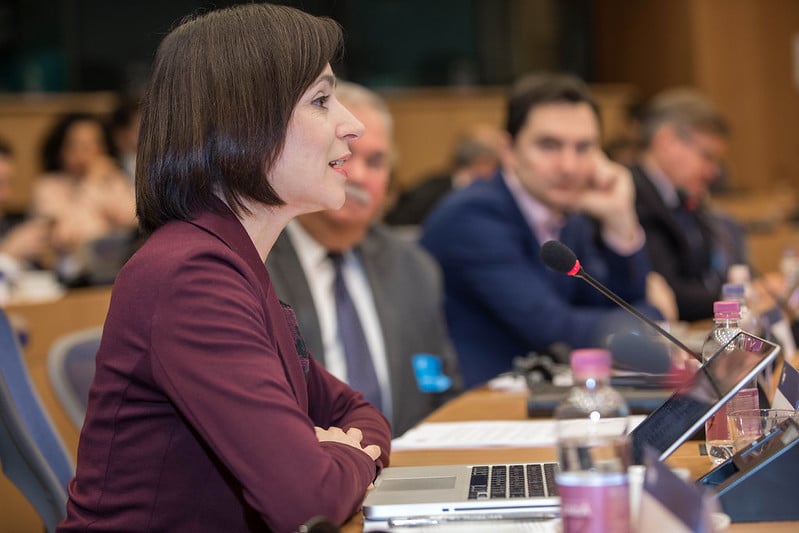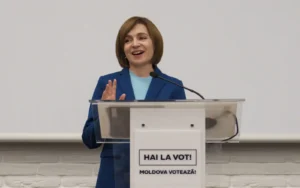Maia Sandu, 2017 (Flickr)
Moldova’s European dream has gained new momentum with the entry into force of a new electoral law. President Maia Sandu’s pro-European government is fighting not only destabilising Russian interference, but at the same time (gender) inequality and discrimination in political advertising.
New electoral law seeks to counter Russian interference
Under the new law, electoral advertising may no longer be financed from abroad by individuals or other legal entities. This means that providers of political advertising must be registered in Moldova. The identification data of the person who paid for the advertisement, along with the date and number of the bank payment must be known. Through these changes in the law, Moldova particularly aims to curb Russian interference in the country. Back in November 2022, Moldovan prosecutors and security officials indicated that they are looking into the funding of pro-Kremlin politicians by the Russian FSB intelligence service. This followed an investigative report by the Washington Post, which stated that former president Igor Dodon and his Socialist Party were funded by the FSB protect Russian interests in Moldova. According to the Washington Post, Russia’s interest now shifted to the disreputable oligarch Ilan Shor who currently resides in Israel following convictions for fraud and money laundering.
The pro-Russian angle led by Dodon and Shor repeatedly tries to undermine Sandu’s pro-European government. Political stability in Moldova is threatened by the economic crisis that Moldova, one of the poorest countries in Europe, is going through and the agitating and destabilising attitude of the pro-Russian parties towards the Moldovan government. For instance, Shor organised a tent camp in Chisinau as part of anti-government protests. Dodon, who lost the 2020 elections and has four criminal cases against him, has lashed out at Sandu more often. For both Dodon and Shor, the ban on foreign funding will be a factor that limits their future campaigning.
Moldova continues improvements in democratisation and representation
The change in the electoral law is positive news for Moldova, which is working hard to democratise its electoral system and make the country’s political system more resilient. In 2019, for instance, it abolished the controversial and unpopular mixed electoral system (introduced in 2017), under which some MPs were elected by direct vote based first-past-the-post. Instead, the country introduced traditional proportional representation. This major electoral reform arose after the Venice Commission recommended the cancellation of the mixed electoral system.
The new law also banned subliminal, misleading, immoral, discriminatory and sexist political advertisements, so as not to encourage panic, violence or dangerous actions. For Moldova, these are big steps towards making the country’s democracy more representative. Yet questions remain about the implementation of the law. Several marginalised groups in Moldovan society face structural inequality, such as the LGBTIQ+ community, which faces discrimination and social problems. For example, same-sex couples are not allowed to marry or adopt children in Moldova. Dodon, during his presidency in 2017, outspokenly said: “I am not president of the gays.” Hence, how conservative parties deal with this new electoral law remains to be seen.
Challenges and opportunities for Moldova’s EU ambitions
The road to the European Union is open for Moldova. Under Sandu, there is a government committed to European integration, but the country has many hurdles to overcome. Oligarchs like Dodon and Shor who pursue destabilising and inflammatory policies, backed by Russia, threaten the democracy and progression the country is experiencing. This includes the observation that the momentum on which these politicians are sailing was partly caused by Russia. Moldova’s lurching economic crisis, for instance, depends partly on Russian gas supplies and the closing of gas taps by Russia-owned Gazprom.
At the same time, Russia’s incursion into Ukraine accelerated Moldova’s integration into the EU. In 2014, after the annexation of Crimea, Moldova was part of the adopted EU resolution that gave Moldova, Georgia and Ukraine the right to apply for EU membership. An important resolution gave that all three countries have Russian troops on their own sovereign territory. On 3 March 2022, a few days after the full invasion, Sandu signed Moldova’s application for EU membership. On 23 June, Moldova was officially granted candidate status along with Ukraine.
The EU is involved in Moldova’s future and vice versa. That is why the country must not fall into the hands of oligarchs and should be given continued support in its democratisation. This can be done through financial support in the geopolitical crisis, but also by offering the country a transparent perspective on its European future.
Author: Mathieu Neelen
Sources: 4FreeRussia, BalkanInsight1, BalkanInsight2, EmergingEurope, ThePinkNews, WashingtonPost
Photo: Flickr



